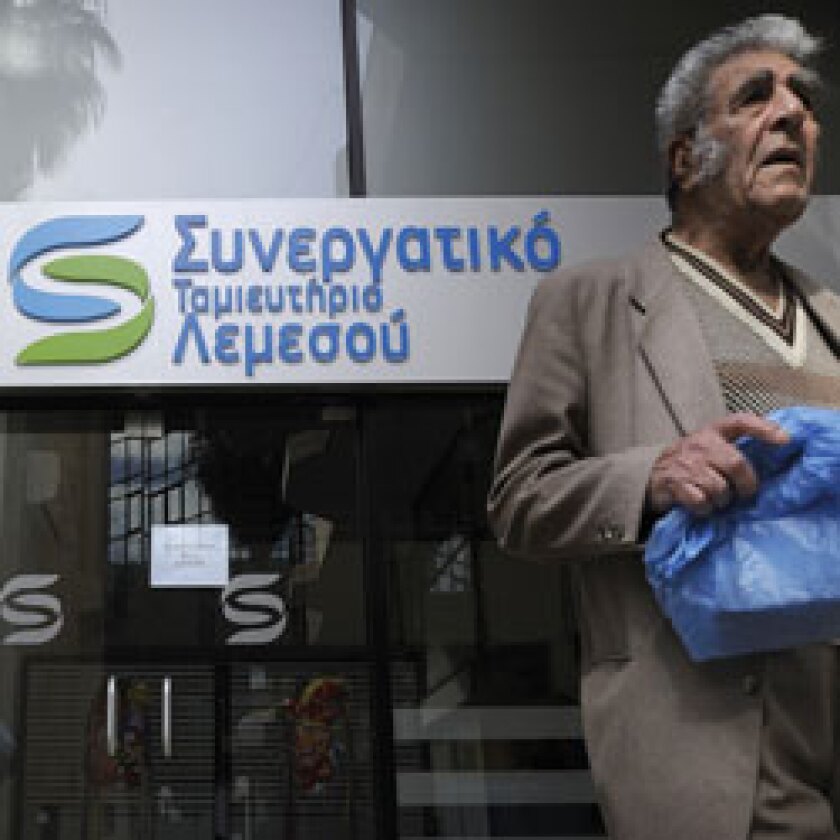A bailout of Cyprus’ debt-laden economy sparked street protests and drew instant criticism from the political, legal and financial communities, with experts branding the pact unfair, inequitable and legally questionable.
As soon as the news of the €10 billion bailout deal emerged, the Cypriot capital Nicosia was flooded with customers desperate to withdraw savings from overwhelmed bank branches and ATMs, generating fears of a serious run on the Mediterranean island’s banks.
The deal, a de facto “bail-in” unique in the recent history of eurozone bailouts, taxes depositors directly and heavily. Anyone with deposits of more than €100,000 held at a Cyprus-based lender will lose 9.9% of the total by the time banks open after a three-day holiday weekend, with a 6.75% levy enforced on deposits below that level.
Officials at the European Central Bank and the IMF, who hammered out the deal with eurozone finance leaders, aim to raise €5.8 billion, helping put Cyrus on track to cut its sovereign debt to 100% of GDP by 2020.
EU finance leaders hailed the “ambitious” and “determined” deal, but many others lambasted the new measures. Sharon Bowles, chair of the European Parliament’s economic and monetary affairs committee, described the bail-in – euphemistically termed an “upfront one-off stability levy” by EU bureaucrats – as an attack on depositors. “It robs smaller investors of the protection they were promised. If this were a bank, they would be in court for mis-selling.”
On the issue of legality, a banker with knowledge of European financial legislation said EU Treaty provisions allowed EU member states legally to impose temporary capital controls to preserve financial stability. Yet to many, the move smacked of legislative overreach: the sort of political strong-arming that European leaders used to decry in Latin America or Asia.
Bowles said that the “grabbing of ordinary depositors’ money” was merely billed as a tax “so as to try and circumvent the EU’s deposit guarantee laws.”
Others queried why Cypriots had been singled out for special treatment. “Why no pain in Spain but losses in Cyprus?” asked Peter Hahn, a key advisor to the UK’s Financial Services Authority. “Surely EU rules require equality of [financial] rescues.”
Many pointed to the island’s status as a harbour for wealth accumulated by Russian oligarchs. “This is all about not wanting to bail out Moscow’s super-rich,” noted a European tax lawyer, who declined to be named.
Observers pointed out that the first meeting in finance minister Michalis Sarris’ diary on Monday is not in Brussels, or explaining the deal publicly to enraged Cypriot depositors, but with his political counterparts in Moscow.
Going forward, the deal also raises uncomfortable issues of precedence: that European governments can replicate this deal anywhere, at any time.
This may create bank runs in other members of the eurozone’s periphery if rumours of a similar bail-in circulate.
That, warned Holger Schmieding, chief economist at Berenberg Bank in London, “would weaken [Europe’s] fragile banking systems even further”.
Regions like Latin America remained unaffected by the deal but, added Schmieding, “if tensions within the eurozone were to escalate again, all of Europe’s trading partners would be hurt.”
- Like every year, Emerging Markets daily newspaper covers the Inter-American Development Bank’s annual meeting, held in Panama in mid-March. Pick up your copy at the meeting, read the news on our website and follow us on twitter @emrgingmarkets
